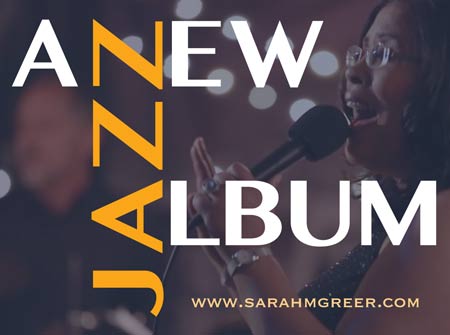There is No Comma in This Title
This post first appeared on Dec 4, 2017 in The Spoke published by The Albright Institute.
When we name something, we create it — a reflection on cultural identity and authenticity in music
I have not named very many things in my adult life. I do not have children and my pets have usually arrived with names already firmly in place. As a black, African American, biracial woman, however, I well know the importance of language and names. Ours is a history of being unnamed, renamed, and mis-named. We personally and keenly understand that the names we give people, animals, even things, inform how we view, receive, and interact with them. Therefore, when it came time to name my album, I knew that its name had work to do. It needed to hold this group of songs individually and collectively. It also needed to speak to its genre, jazz.
I have been working full-time as a singer for a decade. In this time, I have learned that as an artist, I have the responsibility and privilege to create art. My most recent artistic undertaking — writing and recording an album of original jazz songs — stems from this understanding. As I began work on my project, I resolved to write the songs that “arrived.” In other words, I did not decide to write an album of love songs, or songs about the seasons, or songs in certain keys. Instead, I chose to work through each of my song ideas as it presented itself, in the way that it presented itself.
Some songs came easily — a lyric and melody would arrive and I would follow them down their musical path until they reached their destinations. Others came in pieces or in dreams. Some were insistent. Others were reluctant to be revealed. In the end, I have written a collection of songs about my love for family and friends, about expressing — and being — one’s true self, and about living as a woman of color. To say that this collection of songs is varied might be an understatement.
So. How to name such a project? Names like “Songs I Wrote” and “Untitled” don’t do the work. As important, they cannot convey the rich complexity of what jazz does. For me, jazz sits at an intersection of the sounds, history and feeling of its many, many icons and the tones, stories and needs of present day jazz makers and listeners. The history and formation of jazz include combining the familiar, the new and the available in inventive and alternative ways.
My album’s title needed to hold all of this, to name all of this.
…
I am not quite sure when I came up with the title “What the Music Says Do.” I know it was not my first idea for a title (or my last). I kept the name to myself for weeks, but the more time I spent with it, the more convinced I became that this was my title. It captured my experience of creating the album. My belief that an answer can always be found if I simply listen for the music and then, without ego or agenda, do what it tells me to do.
But names are funny, and sometimes they do things we don’t expect. When I launched my Kickstarter to crowdfund support for my work, the album’s name became public and people started to ask questions.
“Did you mean ‘What the Music Says’?”; No, I didn’t.
“Did you mean ‘Do What the Music Says?’”; No, not really.
“Should the title, perhaps, have a comma? As in, ‘What the Music Says, Do’.”
This last gentle query was from my mother, a former writing instructor. I am grateful to her for posing this question because in our conversation, I discovered that I was absolutely certain that this title has no comma.
As a black woman writing songs in an African American musical genre, it feels important to honor the syntax of the name of the spiritual that inspired my album title — “I’m Gonna Do What the Spirit Says Do.” My choice of the name “What the Music Says Do,” pays homage to one of the African American musical traditions from which jazz descended, spirituals, while resisting a frequent desire of dominant culture to tidy, correct or anglicize black language. I see the same desire to tidy, correct and anglicize jazz. A black art form, jazz is rooted in oral and aural traditions. This is not because black people were not or are not educated enough to write this music down. It is because this music (jazz) is a language in its own right. Dissecting it or notating it, often results in subjecting this language to a Western, European idea.
Jazz is transmitted from mouth to ear; from instrument to body. When I perform, I am sharing the jazz language with you — a language with its own syntax, semantics, and lexicon that cannot fully or faithfully be transcribed. The songs on my album are quite literally my voice. I have done what the music says to birth this album.
And I am the one who names it.



